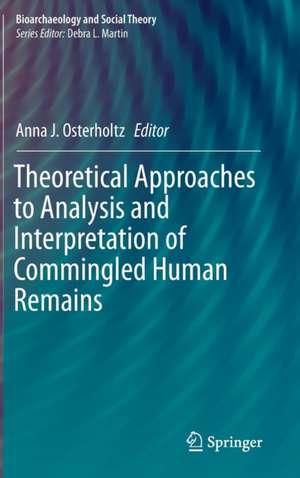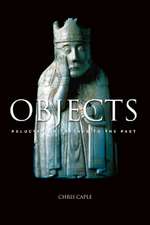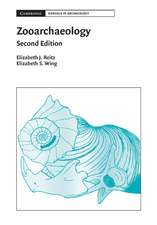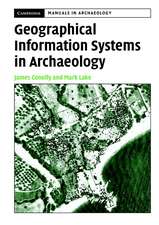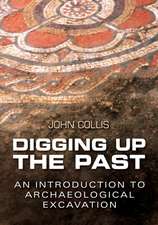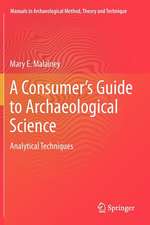Theoretical Approaches to Analysis and Interpretation of Commingled Human Remains: Bioarchaeology and Social Theory
Editat de Anna J. Osterholtzen Limba Engleză Hardback – 13 noi 2015
Theoretical Approaches to Analysis and Interpretation of Commingled Human Remains provides case studies that illustrate how an appropriate theoretical model can be used with commingled and fragmentary remains to add to overall site and population level interpretations of past and present peoples. Specifically, the contributions show a blending and melding of different social theories, highlighting the broad interpretive power of social theory. Contributors are drawn from both the Old and New World. Temporally, time periods from the Neolithic to historic periods are present, further widening the audience for the volume.
| Toate formatele și edițiile | Preț | Express |
|---|---|---|
| Paperback (1) | 386.81 lei 6-8 săpt. | |
| Springer International Publishing – 23 aug 2016 | 386.81 lei 6-8 săpt. | |
| Hardback (1) | 394.12 lei 6-8 săpt. | |
| Springer International Publishing – 13 noi 2015 | 394.12 lei 6-8 săpt. |
Din seria Bioarchaeology and Social Theory
-
 Preț: 357.04 lei
Preț: 357.04 lei - 18%
 Preț: 732.70 lei
Preț: 732.70 lei - 20%
 Preț: 538.76 lei
Preț: 538.76 lei - 18%
 Preț: 1117.34 lei
Preț: 1117.34 lei -
 Preț: 391.99 lei
Preț: 391.99 lei - 18%
 Preț: 738.06 lei
Preț: 738.06 lei - 15%
 Preț: 701.06 lei
Preț: 701.06 lei - 15%
 Preț: 585.57 lei
Preț: 585.57 lei - 18%
 Preț: 896.52 lei
Preț: 896.52 lei - 15%
 Preț: 697.97 lei
Preț: 697.97 lei - 18%
 Preț: 728.11 lei
Preț: 728.11 lei - 18%
 Preț: 731.10 lei
Preț: 731.10 lei - 15%
 Preț: 498.79 lei
Preț: 498.79 lei - 18%
 Preț: 953.03 lei
Preț: 953.03 lei - 18%
 Preț: 890.37 lei
Preț: 890.37 lei - 18%
 Preț: 726.55 lei
Preț: 726.55 lei -
 Preț: 385.47 lei
Preț: 385.47 lei - 24%
 Preț: 683.09 lei
Preț: 683.09 lei - 24%
 Preț: 863.81 lei
Preț: 863.81 lei - 24%
 Preț: 733.61 lei
Preț: 733.61 lei - 15%
 Preț: 643.34 lei
Preț: 643.34 lei
Preț: 394.12 lei
Nou
Puncte Express: 591
Preț estimativ în valută:
75.42€ • 80.64$ • 62.88£
75.42€ • 80.64$ • 62.88£
Carte tipărită la comandă
Livrare economică 17 aprilie-01 mai
Preluare comenzi: 021 569.72.76
Specificații
ISBN-13: 9783319225531
ISBN-10: 3319225537
Pagini: 200
Ilustrații: XIII, 255 p. 65 illus., 40 illus. in color.
Dimensiuni: 155 x 235 x 20 mm
Greutate: 0.56 kg
Ediția:1st ed. 2016
Editura: Springer International Publishing
Colecția Springer
Seria Bioarchaeology and Social Theory
Locul publicării:Cham, Switzerland
ISBN-10: 3319225537
Pagini: 200
Ilustrații: XIII, 255 p. 65 illus., 40 illus. in color.
Dimensiuni: 155 x 235 x 20 mm
Greutate: 0.56 kg
Ediția:1st ed. 2016
Editura: Springer International Publishing
Colecția Springer
Seria Bioarchaeology and Social Theory
Locul publicării:Cham, Switzerland
Public țintă
ResearchCuprins
Chapter 1: Introduction Debra Martin and Anna J. Osterholtz.- Chapter 2: A Tale of Two Platforms: Commingled Remains and the Life-Course of Houses at Neolithic Çatalhöyük Scott D. Haddow, Joshua W. Sadvari, Christopher J. Knüsel and Rémi Hadad.- Chapter 3: Bodies in Motion: Identity and Migration in Cyprus during the Bronze Age Anna J. Osterholtz.- Chapter 4: Part of the Family: Age, identity and burial in Copper Age Iberia Jess Beck.- Chapter 5: Limited Circumstances: Creating a Better Understanding of Prehistoric Peoples through the Reanalysis of Collections of Commingled Human Remains Maria Panakhyo and Keith Jacobi.- Chapter 6: When space is limited: A spatial exploration of pre-Hispanic mortuary and ritual microlandscape Lori Epistein and J. Marla Toyne.- Chapter 7: Patterned Processing as Performative Violence Anna Osterholtz.- Chapter 8: Contexts, needs and social messaging: Situating Iroquoian human bone artifacts in southern Ontario, Canada Tara Jenkins.- Chapter 9: In morbo et in morto: transforming age and identity within the mortuary context of Oymaağaç Höyük, northern Turkey Kathryn E. Marklein and Sherry C. Fox.- Chapter 10: Linking Health and Marriage Practices among Commingled Assemblages: A Case Study from Bronze Age Tell Abraq, UAE Kathryn Baustian and Cheryl Anderson.- Chapter 11: Cemetery
Preservation and Beautification of Death: Investigations of Unmarked Early to Mid-Nineteenth Century Burial Grounds and Cemeteries in Central Kentucky Peter Killoran, David Pollack, Stuart Nealis, Emily Rinker.- Chapter 12: Commingled Bodies and Mixed and Communal Identities Tiffiny A. Tung.
Preservation and Beautification of Death: Investigations of Unmarked Early to Mid-Nineteenth Century Burial Grounds and Cemeteries in Central Kentucky Peter Killoran, David Pollack, Stuart Nealis, Emily Rinker.- Chapter 12: Commingled Bodies and Mixed and Communal Identities Tiffiny A. Tung.
Notă biografică
Anna Osterholtz has recently completed her Ph.D. at the University of Nevada-Las Vegas focusing on social change, migration, and identity during the Bronze Age on Cyprus. Her primary research interests center around commingled and fragmentary assemblages of human remains and the unique stories they tell. She has active research projects in the Americas, Europe, the Middle East, and the Mediterranean.
Textul de pe ultima copertă
This volume centers on the application of social theory to commingled remains with special focus on the cultural processes that create the assemblages as a way to better understand issues of meaning, social structure and interaction, and lived experience in the past. The importance of the application of theoretical frameworks to bioarchaeology in general has been recognized, but commingled and fragmentary assemblages require an increased theoretical focus. Too often these assemblages are still relegated to appendices; they are analytical puzzles that need the interpretive power offered by social theory.
Theoretical Approaches to Analysis and Interpretation of Commingled Human Remains provides case studies that illustrate how an appropriate theoretical model can be used with commingled and fragmentary remains to add to overall site and population level interpretations of past and present peoples. Specifically, the contributions show a blending and melding of different social theories, highlighting the broad interpretive power of social theory. Contributors are drawn from both the Old and New World. Temporally, time periods from the Neolithic to historic periods are present, further widening the audience for the volume.
Theoretical Approaches to Analysis and Interpretation of Commingled Human Remains provides case studies that illustrate how an appropriate theoretical model can be used with commingled and fragmentary remains to add to overall site and population level interpretations of past and present peoples. Specifically, the contributions show a blending and melding of different social theories, highlighting the broad interpretive power of social theory. Contributors are drawn from both the Old and New World. Temporally, time periods from the Neolithic to historic periods are present, further widening the audience for the volume.
Caracteristici
Builds on methodological standards, theoretical frameworks and their applications to bioarchaeology Discusses how theoretical approaches towards commingled remains provide key perspectives on ideology, meaning, social structure, agency, and lived experiences in the past Includes a reanalysis of collections of commingled human remains to understand the sociocultural practices of prehistoric peoples through their mortuary behavior Includes supplementary material: sn.pub/extras
